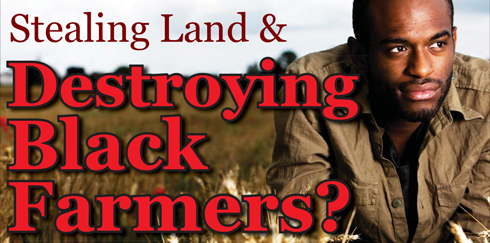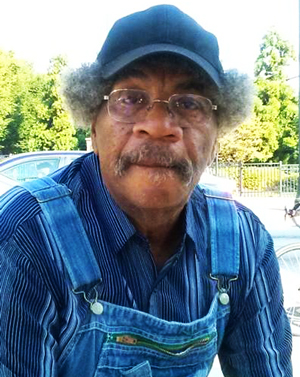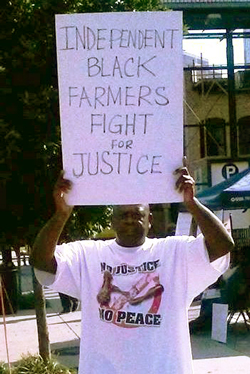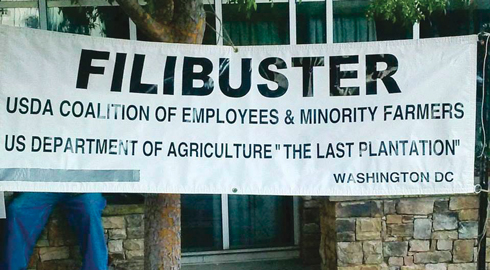Stealing Land & Destroying Black Farmers?
By Eric Ture Muhammad Contributing Writer | Last updated: Sep 17, 2013 - 5:09:06 PMWhat's your opinion on this article?

|
ATLANTA (FinalCall.com) - George B. Hildebrandt is 72-years-old and comes from several generations of farmers.
He has diabetes. He has problems looking into direct sunlight. He struggles to maintain glucose levels to keep his “sugar up.”
His sons were raised on his 242-acre soybean farm. They have moved on, carving out other professions and ending a family tradition of tilling the land.

George B. Hildebrandt is 72-years-old and comes from several generations of farmers. Farmers say they are facing a crisis and want an end to inaction on the federal level and failures to give Black farmers a fair shake.
|
They are desperate.
They are hoping to draw attention to what they call a crisis in Black farming.
Blacks have lost millions of acres of land over the years; have been unfairly denied loans and assistance, and the group of largely aging farmers complain of more stalling on promises made by the United States Department of Agriculture.
They feel cheated. They fear the demise of a lifestyle they have loved and they want justice—whether they will get the justice they seek or not remains a question.
The farmers have engaged in daily protests in downtown Atlanta since Sept. 5 and call themselves “Filibuster,” a movement organized by the USDA Coalition of Black Employees and Minority Farmers.
They call the Agriculture Department “the last plantation” and have vowed to protest until their demands are met. They want promised easy access to low cost loans that should have come alongside debt relief to keep their land. The promises were made by USDA as atonement for decades of denial of loans and support that the farmers qualified for.
The federal government promised to forgive debt incurred as farmers tried to survive the negative and costly impact of racial discrimination. Those promises were made in what is commonly called the Pigford II settlement, which was the result of a lawsuit alleging racially motivated wrongdoing by USDA employees and decision-makers, said protest organizers.

Isaac Decatur, a Black farmer from Georgia, takes part in Atlanta protest.
|
Armed with dozens of individual filings against USDA and its farm loan programs—the small group of farmers from Georgia, Alabama, and Kansas say they are still denied loans, subjected to broken agreements and mistreatment.
They tried to post up on the steps of CNN to get mainstream media attention. CNN security told the mostly elderly group of Black men, they had to move and no protests are allowed on network property.
They were advised to protest in a front of a state park across the street. They moved. Georgia State Police forced the group to move again. Eventually they settled on a corner across from CNN and launched their campaign. Handing out fliers, they talked to whoever would listen, recounting their woes and the alleged abuses. People listened but the press didn’t, said protest organizers.
Not one media outlet covered the demonstrations beyond The Final Call, said the farmers.
Several media outlets verified getting press releases from the group, but they didn’t send reporters to hear the group’s concerns.
In his 36th installment of the weekly lecture series, “The Time and What Must Be Done,” the Honorable Minister Louis Farrakhan Sept. 14 talked about the value God places on land, farming and animal husbandry.
“Farming and agriculture is the first profession that Allah (God) introduced to man,” said Minister Farrakhan.
“And (Allah) God took the man and put him into the Garden of Eden to dress it and keep it,” the Minister said. But, he added, today farmers are aging, disrespected and Black land is dwindling, he said. Blacks must get back to farming and purchase land to ensure their survival, he warned.

Despite a settlement with the U.S. Department of Agriculture, Black farmers say justice has not been done and many have not benefitted from the agreement.
|
After the Civil War, Southern governments instituted codes prohibiting Black ownership or leasing of land, except in designated all Black areas controlled by Whites, said the Minister.
Unless Whites consented, Blacks could not sell farm products and Whites eliminated the threat of Black competition, he said.
Between 1865 and 1910, Blacks owned an estimated 16 million acres of land. Today, Blacks just own about 4 million acres of land, Min. Farrakhan said. (See edited transcript).
Nation of Islam Minister of Agriculture Dr. Ridgely Muhammad called the Pigford I and II settlements not only shams but a return to the black codes of the 1800s that denied Blacks farmland.
“The 3,000 farmers under those settlements were subject to foreclosure. They were suffering from discrimination and lack of services. But if you prevailed in the settlement you were guaranteed injunctive relief. Meaning debts were forgiven or settled and it was supposed to now be easier for you to get loans and services,” he explained.
But things haven’t gotten easier, Dr. Muhammad contends. “They are still rejected. Instead of paying the farmers, they (USDA) expanded the number of people to be paid under the settlement” and at lower than desired amounts.
The majority of those paid were non-farmers and farmers who did receive a low ball payout of $50,000 cannot rebuild or save their land because of the same old problems of loan denials, no debt forgiveness and no help, he said.
Ferrell Oden, co-organizer of Atlanta Filibuster, told The Final Call USDA has all but killed him.
With the loss of his family, land, businesses, and millions in projected revenue, Mr. Oden said there is nothing left for him to do but fight.
He accused the USDA of delaying responses to applications for loans and needed support programs. Unable to get assistance he qualified for, Mr. Oden said his expenses and debts mounted.
The Talladega County, Ala., native raised cattle, hogs and chickens. He attended the University of Montevallo School of Business in Alabama. He said he worked with Tuskegee University in drafting a plan for raising both catfish and cattle. His attempt to obtain a loan to purchase a 205-acre Dallas County, Ala., farm to raise catfish and cattle was denied by a USDA agency, he said. A bid on the land expired and the property was sold from under him, according to Mr. Oden.
He sees his personal struggle as part of a bigger fight. “In order for the farmer to survive, we need a market, a market created so that we can be independent, prosperous, feed our people, and take their mouths off of fast death food chains,” said Mr. Oden, who agreed that farming is the engine of Black self-development.
Given his perspective the plight of a few Black farmers staked out on a street corner in Atlanta may be one of the most important protests that too few have seen.
INSIDE STORIES AND REVIEWS
-
-
About Harriett ... and the Negro Hollywood Road Show
By Rabiah Muhammad, Guest Columnist » Full Story -
Skepticism greets Jay-Z, NFL talk of inspiring change
By Bryan 18X Crawford and Richard B. Muhammad The Final Call Newspaper @TheFinalCall » Full Story -
The painful problem of Black girls and suicide
By Charlene Muhammad -National Correspondent- » Full Story -
Exploitation of Innocence - Report: Perceptions, policies hurting Black girls
By Charlene Muhammad -National Correspondent- » Full Story -
Big Ballin: Big ideas fuel a father’s Big Baller Brand and brash business sense
By Bryan Crawford -Contributing Writer- » Full Story






 Click Here Stay Connected!
Click Here Stay Connected!








